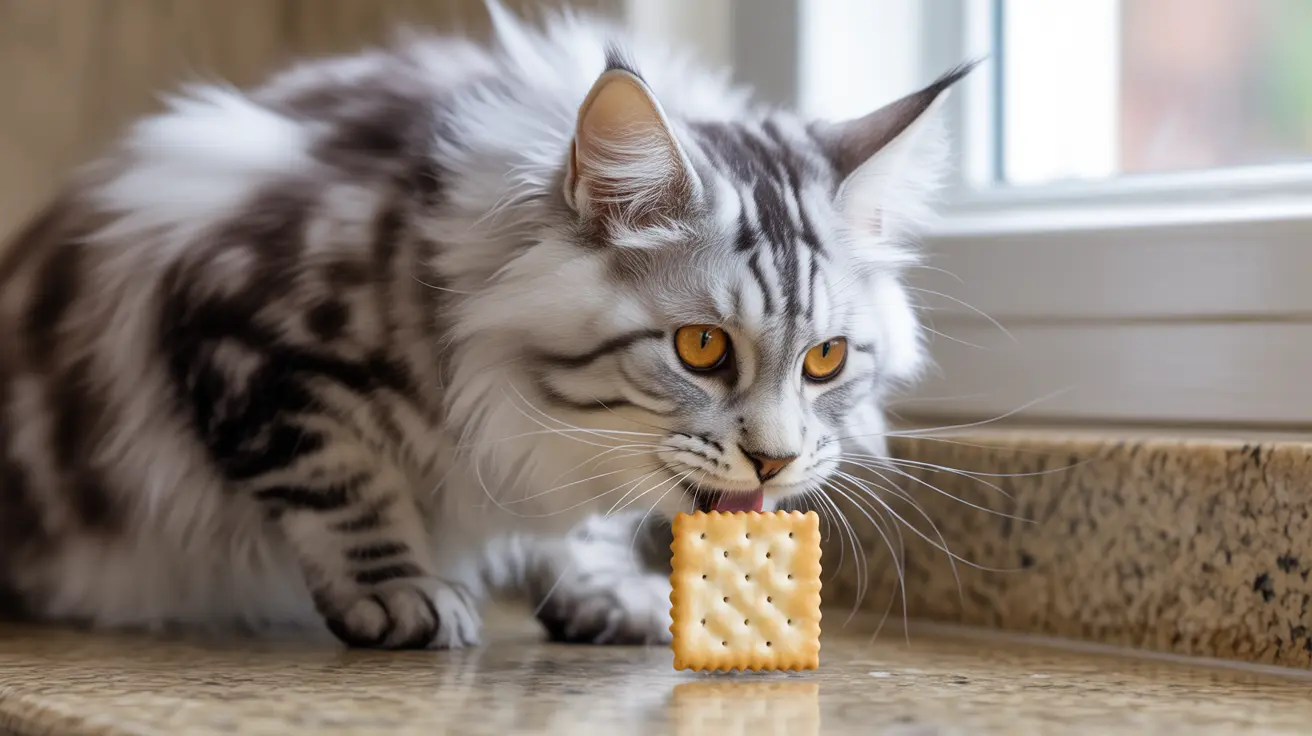If you've ever caught your cat eyeing your saltine crackers with curiosity, you might have wondered whether sharing this common snack is safe. As a veterinary nutritionist, I can tell you that while saltine crackers aren't immediately toxic to cats, they're far from an ideal treat and can pose significant health risks when consumed regularly.
In this comprehensive guide, we'll explore why saltine crackers aren't suitable for feline consumption, what risks they pose, and what you should do if your cat manages to sneak a few bites. We'll also discuss healthier alternatives to satisfy your cat's snacking desires.
Understanding Why Saltine Crackers Are Problematic for Cats
Cats are obligate carnivores, meaning their bodies are designed to process and utilize nutrients primarily from animal-based proteins. Saltine crackers, composed mainly of refined flour, salt, and shortening, offer virtually no nutritional value for cats while presenting several potential health concerns.
The Nutritional Mismatch
A typical saltine cracker contains:
- High levels of sodium (approximately 941mg per 100g)
- Refined carbohydrates (74g per 100g)
- Minimal protein (9.5g per 100g)
- No essential feline nutrients like taurine or arachidonic acid
Health Risks Associated with Feeding Saltine Crackers to Cats
Sodium Concerns
The high salt content in saltines is particularly problematic for cats, who need only a fraction of the sodium that humans do. Excessive sodium intake can lead to:
- Dehydration
- Increased blood pressure
- Kidney stress
- In severe cases, sodium ion poisoning
Digestive Issues
Cats lack the necessary enzymes to properly digest large amounts of carbohydrates. Regular consumption of saltines can result in:
- Gastrointestinal upset
- Vomiting
- Diarrhea
- Bloating and discomfort
What Happens If Your Cat Eats Saltine Crackers?
If your cat consumes a small amount of saltine crackers, they'll likely be fine. However, monitor them for signs of distress, including:
- Excessive thirst
- Lethargy
- Digestive upset
- Changes in behavior or appetite
Healthy Alternatives to Saltine Crackers
Instead of saltine crackers, consider these cat-appropriate treats:
- Commercial cat treats formulated for feline nutrition
- Small pieces of cooked, unseasoned chicken or fish
- Freeze-dried meat treats
- Cat grass for natural fiber
Prevention and Best Practices
To protect your cat from inappropriate snacks:
- Store crackers and other human snacks in sealed containers
- Never intentionally feed saltines as treats
- Educate family members about safe and unsafe cat foods
- Keep healthy cat treats readily available
Frequently Asked Questions
Can cats safely eat saltine crackers or are they harmful?
While not immediately toxic, saltine crackers are harmful to cats when consumed regularly due to their high sodium content and inappropriate nutritional composition. It's best to avoid feeding them to cats entirely.
What health risks can saltine crackers pose to cats if eaten regularly?
Regular consumption of saltine crackers can lead to obesity, diabetes, digestive issues, sodium toxicity, and potential kidney problems in cats. The high carbohydrate content can also contribute to weight management issues.
How much salt in saltine crackers is dangerous for cats?
Even small amounts of salt can be problematic for cats. A single saltine cracker contains more sodium than a cat should consume in supplemental form. Chronic overconsumption can lead to serious health issues.
What should I do if my cat accidentally eats saltine crackers?
Monitor your cat for signs of distress such as excessive thirst, vomiting, or diarrhea. If they've consumed a large amount or show concerning symptoms, contact your veterinarian immediately.
What are healthier, safe treat alternatives to saltine crackers for cats?
Choose commercially prepared cat treats, small pieces of cooked lean meat, or freeze-dried meat treats specifically formulated for cats. These alternatives provide appropriate nutrition without the risks associated with human snacks.
Remember, while cats might show interest in human snacks like saltine crackers, it's our responsibility as pet owners to provide them with species-appropriate nutrition that supports their health and well-being.






